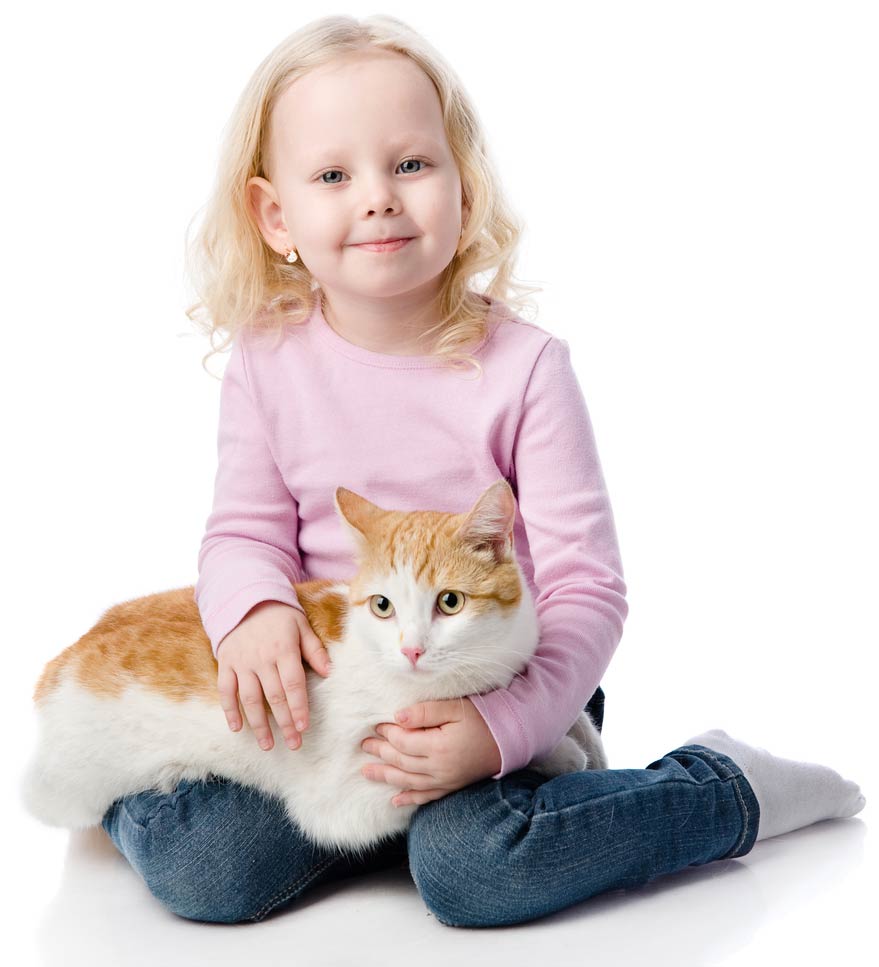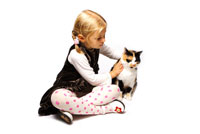How to Introduce a Cat to Children

Cats are the most prevalent family pet in the United States and it’s no wonder. They’re quiet, compact, and easy to care for—a perfect match for busy families with kids. Raising children with pets provides many benefits. According to the American Academy of Child & Adolescent Psychiatry, pets can:
- Teach empathy and compassion
- Provide love, loyalty and affection
- Foster self esteem
- Promote physical activity
- Teach responsibility
- Provide valuable life lessons
- Provide a connection to nature.1
What cat lover wouldn’t want to share these wonderful values with their children?
Children are naturally drawn to cats, but it’s important to lay some ground rules for the safety of all concerned. An overzealous toddler could severely hurt a kitten. On the flip side, cat scratches and bites can pose serious health risks to your child. The key to promoting harmony between cats and kids is to monitor their interactions at all times and to teach children how to handle cats with kindness and respect.
Cats and Babies
There’s an old wives’ tale that a cat can become jealous and suck away a baby’s breath. This has no basis in fact. Most cats will steer clear of a new infant, whose sounds and smells seem altogether alien. Your cat is more likely to be upset by all the changes around the house than by the baby itself. New parents are often busy, tired, and much less focused on the family pet than they used to be. Here are some suggestions to make things go smoother when baby makes four:
- Because of risk of suffocation, never allow a cat to sleep with an infant. Simply close the nursery door and use a baby monitor. If your prefer leaving the baby’s door open, consider installing an inexpensive screen door.
- Gradually introduce new baby furniture, bedding, and equipment before the baby arrives. While your newborn is still in the hospital, consider bringing home a nursery blanket or onesie with the baby’s scent. This will lessen the shock to your cat when the baby finally comes home.
- Busy as you are, set aside a few minutes a day to groom and play with your cat, just like old times. This will reassure your feline that some things haven’t changed.
- Encourage your cat to investigate as you hold or feed the baby. Gently reassure your cat and encourage her to sniff and investigate. Help your cat satisfy her curiosity while forming positive associations with the new family member.

Cats and Toddlers
When baby goes mobile, the real fun begins….but not for your cat! Your toddler regards a cat as an animated stuffed toy just waiting to be squeezed, prodded and chased. Young children don’t have the ability to read a cat’s body language or reign in their own angry or aggressive feelings. Toddlers operate at your cat’s eye level, move erratically, and emit unearthly giggles and squeals. Even the most confident cat can sense danger. And the gentlest feline may strike out when cornered or hurt. It can take a while to teach your child to interact appropriately with your cat, but it’s never too early to start.
- To protect both your toddler and your cat, never leave them together unsupervised.
- Teach your child the proper way to interact with a cat. Show her how to gently stroke her head and back, avoiding more sensitive areas such as tail, feet and belly. Stroke your toddler’s arm gently to show how good it feels. Explain that poking, squeezing or pulling fur, tails, and ears aren’t OK.
- Quiet voices are a must as well.
- Teach your child never to put her face near a pet. Scratches and bites of the head and neck are both most common and most dangerous.
- Never touch the cat when she is eating or sleeping.
- Do not chase the cat. If she runs away, it means she’s had enough.
- Make sure your cat has many safe escape perches. The top of a bureau, under a bed, or a gated-off room work well.
- Watch body language. If either child or cat are getting overly worked up, it’s time to separate them.
Cats and Older Children
School-age children are more reliable and are ready to start learning important lessons about caring for their feline family member.
- Do not allow rough play. This only encourages the cat to use teeth and claws. Teach your child appropriate ways to play with your cat using safe cat toys.
- Do not allow children to tease the cat. Teach the difference between teasing and playing.
- Teach children to properly handle a cat. An adult cat should never be picked up by the scruff of the neck. Show children how to support the cat under the chest with one hand, while supporting the hindquarters with the other.
- Model the proper behavior by treating your cat with affection and respect at all times.
- Involve older children in caring for your cat. Seven- to eight-year-olds can replenish food and water bowls; ten year olds can gently brush the cat and even help keep litter pan clean. This is a great way for children to start learning responsibility for other living things.
- Educate your child. Borrow books about cats from the library. Download age-appropriate information from a website like the AVMA kids’ corner.
- Teach children to close the door! Many an indoor cat has gotten injured or lost when children inadvertently left the outside door open.
Health Concerns
Too many cats end up homeless once a baby is on the way, because of fears the cat may carry disease. These risks can be minimized with the proper precautions.
- Bring your cat for regular veterinary checkups and fecal examinations. Your veterinarian will make sure your cat is appropriately vaccinated and free of infectious diseases and parasites that could pose a risk to your family.
- Keep your cat indoors. This minimizes her exposure to human-illness-causing organisms such as fleas, intestinal parasites, Salmonella, Toxoplasmosis, and Cat Scratch Disease.
- Wash hands after handling your cat and especially before eating. This is especially true for children under five years of age, who are more at risk.
- Avoid letting your child kiss your cat, or allowing your cat to lick your child’s face.
- Scoop litter boxes daily. Periodically disinfect litter boxes with detergent and hot water. And never allow a curious toddler access to the litter pan!
Update on Pet Allergies
Experts used to think that exposure to furry pets promoted allergies and asthma in young children. Sadly, many expectant parents with a family history of allergies were told to get rid of the family cat. Newer research indicates that the exact opposite is true. One prominent 2002 study indicated that having two or more dogs and cats during the first year of life actually reduced the child’s chance of having pet allergies at ages six and seven.2 Another study showed that childhood exposure to cats decreased the likelihood of cat allergy in adulthood, especially when there was a family history of allergy to cats.3 It seems that early exposure to pets can actually “educate” the immune system in children.
Learning empathy and respect for another living creature is the best education of all.
- “Facts for Families #75: Pets and Children” 2006. American Association of Child & Adolescent Psychiatry. 26 February 2011 http://aacap.org/page.ww?name=Pets+and+Children§ion=Facts+for+Families
- Ownby DR. Exposure to dogs and cats in the first year of life and risk of allergic sensitization at 6 to 7 years of age. JAMA - 28-Aug-2002; 288(8): 963-72.
- Roost HP. Role of current and childhood exposure to cat and atopic sensitization. Journal of Allergy and Clinical Immunology - 01-Nov-1999; 104(5): 941-7.
You May Also Like These Articles:
How to Introduce a New Cat to a Household that Already Has a Cat
Tips for Feeding Cats in Multiple Cat Households
Best Breeds for Multi-Cat Households
Top 10 Most Popular Cat Breeds - Slideshow




